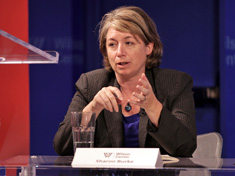-
Sharon Burke on How the U.S. Military Is Planning for Climate Change
April 1, 2016 By Sean Peoples Climate change is impacting the U.S. military in two major ways, explains Sharon Burke in this week’s podcast.
Climate change is impacting the U.S. military in two major ways, explains Sharon Burke in this week’s podcast.Climate change is impacting the U.S. military in two major ways, explains Sharon Burke in this week’s podcast.
Burke, who served as the first assistant secretary of defense for operational energy from 2010 to 2014 and is now with the New America Foundation, says the Department of Defense has done a lot to consider how changing climate conditions will affect their equipment and facilities, but also their missions.
“The Department of Defense is a very large land owner in the U.S. and around the world,” Burke says. Facilities in arid climates such as those found in the Mojave Desert and the White Sands Missile Range in New Mexico are already seeing a variety of climate effects, including higher temperatures and drier conditions making it harder to train.
The military has also changed building codes, she says, “so that if you want to build new military construction, you have to take climate change into consideration.”
Beyond equipment and infrastructure, the U.S. military is adjusting to climate change by planning for new operations. The Pentagon expects to be called on for more humanitarian and disaster relief missions; there may be new partnerships with allies to help their forces prepare; new environments to deploy in; and new conflicts.
The Arctic is a symbol of the military’s concerns, Burke says. The region is warming faster than anywhere else on Earth, opening up new sea lanes and access to resources, and prompting Russia to make territorial claims. “It’s an operating environment, it’s facilities and equipment, it’s also missions, it’s also geopolitics, and a geostrategic interest,” she says. The region “engages every interest they have and they take it very seriously.”
The Quadrennial Defense Review, the military’s signature strategic document, calls climate change a “threat multiplier,” reflecting concern over political stability. But where there’s room for growth is in this priority trickling down the chain of command, said Burke.
“There’s been a high level commitment on the issue, but then if you look at how are they actually incorporating it and how they plan for the future, I think there’s a lot of room to travel there.”
Sharon Burke spoke at the Society of Environmental Journalists Conference on October 9, 2015.
Friday Podcasts are also available for download on iTunes and Google Podcasts.
Topics: adaptation, Arctic, Asia, climate change, conflict, cooperation, disaster relief, environment, environmental security, Friday Podcasts, humanitarian, land, military, NATO, oceans, podcast, QDR, Russia, security, U.S.
 A Publication of the Stimson Center.
A Publication of the Stimson Center.

 Climate change is impacting the U.S. military in two major ways, explains Sharon Burke in this week’s podcast.
Climate change is impacting the U.S. military in two major ways, explains Sharon Burke in this week’s podcast.

